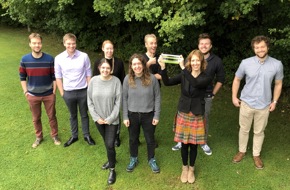Highlights
- Replacing wild caught fish oil with algae products, reducing impacts on the oceans.
- Use of distillery by-products to grow algae packed with Omega-3 for animal nutrition.
- Treatment and recycling of distillery by-products.
- Re-use of treated water in distilleries.
- Process fuelled by AD generated energy.

MiAlgae have researched and developed their process over a period of five years and are collaborating with Scottish distilleries to produce an added value solution for their by-products.
Distilleries produce significant quantities of liquid as a by-product of the distilling process. This liquid contains nutrients, and MiAlgae use it to grow algae, a rich source of Omega-3.
Omega-3 is an essential part of the diet of fish, and the aquaculture sector in Scotland requires large quantities of it for salmon production. It is also used as nourishing additive in the pet food industry. The demand for Omega-3 is met mostly from tonnes of fish caught off the coast of South America, where they have fed on algae rich in Omega-3 and have accumulated it in their bodies.
Growing algae using distillery by-products protects the ecosystems of the Pacific, while removing the need for international shipments and so reducing CO2 emissions. Using pot ale from a single Scottish distillery enables production of 35 tonnes of algae a week, saving 80,000 tonnes of CO2 annually. This could also replace 51,000 tonnes of wild caught fish being shipped to the UK from South America each year. In addition, the process would allow the average distillery the ability to re-cycle over 14million litres of water each year.
The remaining waste from MiAlgae’s production process is converted to green energy by anaerobic digestion, and the full bioprocess runs of bioenergy. With the company’s microalgal products it is aimed to strongly contribute to the sustainability of the animal nutrition sector. The new products are more financially accessible than existing sustainable ones, facilitating economic growth of the pet food and aquaculture industries in Scotland.
MiAlgae manages its own environmental impacts, having achieved accreditation to ISO 14001.
The company believes that diversity and inclusion are critical to business success, and that conviction is evidenced through the breadth of diversity across the existing team. MiAlgae is committed to the Scottish Business Pledge, and has a mean gender pay gap of -10%.
MiAlgae is committed to STEM outreach in schools and colleges to promote the uptake of careers in biotechnology, and the potential of the industry itself as a powerful tool for tackling current environmental problems.